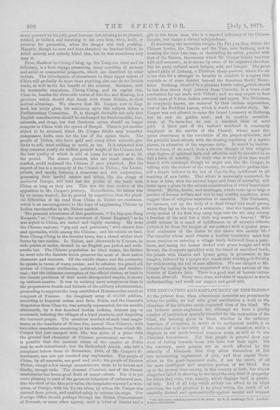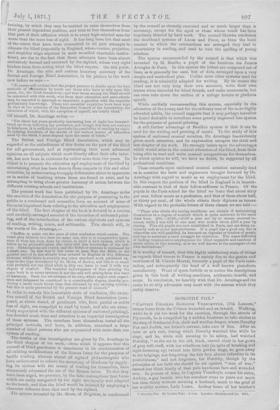THE EDUCATION AND EMPLOYMENT OF THE BLIND.* AT the present
time, when educational measures are prominently before the public, wo hail with great satisfaction a work on the education of the hitherto much-neglected class of the blind. We say hitherto much-neglected, for, although we have a goodly number of institutions specially intended for the instruction of the blind, the training given in these, whether in the ordinary branches of education, in music or in mechanical trades, is so defective that it is unworthy of the name of education, and is a. disgrace to our mach-boasted common sense, as well as to our Christian benevolence. Not that people in general show any want of feeling towards those who have lost their sight. On the contrary, most persons are so much affected by the calamity of blindness that they allow themselves to fall into unreasoning expressions of pity, and thus expose them- selves to the good-humoured smile, if not the scorn, of all the more intelligent and sensitive portion of the blind. But up to the present time society, in this country at least, has almost altogether failed in showing to the blind the only kind of sympathy for which they care, that, namely, which displays itself in practi- cal help. Aud of all help which society can afford to its blind members, the most practical is to place within the reach of all carefully devised and systematically-applied mental and manual
• 71re isVacatient andEmp:opnent of the Mind, By T. II. Armitage, II.D. Leaden: It ober t Ilardwicao.
training, by which they may be enabled to raise themselves from their present dependent position, and thuis to free themselves from that part of their affliction which is to every high-minded man far worse than the mere loss of sight. It has long been felt that most of the errors that have been committed in all past attempts to educate the blind (especially in England, where routine, prejudice, and stupidity reign supreme in most so-called charitable institu- tions), are due to the fact that these attempts have been almost 'exclusively devised and executed by the sighted, whose very sight Blinders them from seeing what the blind require. On this point, Dr. Armitage, the able and zealous honorary secretary of the British and Foreign Blind Association, in his preface to the work now before us says :—
" It seems self-evident that the proper persons to decide upon the best methods of ittatruction by touch are those who have to rely upon this sense, viz., the blind themselves ; and that those among the blind should be entrusted with this work, who from their education and antecedents may be expected to approach so important a question with the requisite preliminary knowledge. These two essential requisites have been kept in view in the selection of the Executive Council of the Association, the members of which, with the exception of myself, aro totally blind."
Of himself, Dr. Armitage writes:— "For about ton years gradually increasing loss of sight has incapaci- tated me from following my profession, and though this does not amount to blindness, it is sufficient to preclude the possibility of reading by sight. In judging, therefore, of the merits of the various moans of education used by the blind, I must depend upon the souse of touch."
The British and Foreign Blind Association, which may be regarded as the embodiment of this desire on the part of the blind for self-government, and as representing their most advanced opinions on all subjects which most directly affect their otiet inter- est, has now been in existence for rather more than two years. Its object. is to promote the education and employment of the blind by ascertaining what has been done in those respects in this and other countries, by endeavouring to supply deficiencies either in apparatus or in modes of teaching where these are found to exist, and by attempting to bring about greater harmony of action between the different existing schools and institutions.
The present work has been published by Dr. Armitage under the sanction of the Association for the purpose of presenting to the public in a condensed and accessible form an account of some of the most important facts relating to the education and employment of the blind. The first chapter of the book is devoted to a concise and carefully-arranged account of the invention of embossed print- ing, and of the introduction of the various alphabets and systems of reading, writing, music, and arithmetic. This sketch will, in the words of Dr. Armitage,—
" Suffice to point out the state of utter confusion which exists. Tho usual plan hitherto has been for some ono, who is in comparative ignor- ance of what has been done by others, to start a now system, which is taken up by philanthropists, who have still loss knowledge of the sub- ject. Subscriptions are raised, and the Babel of systems is increased by a fresh one. In this way it has come to pass that the Bible, or the greater part of It, has already boon printed in English in five different systems, while there is scarcely any other standard work published ex- cept in the type introduced by Dr. Howe, of Boston, and this is so small that probably not one blind adult in fifty can learn to road it with any degree of comfort. The wasteful extravagance of thus printing the same book in so many systems is not the only evil arising from this want of harmony. Each has advantages of its own, which might with expori- once and judgment be combined to a considerable degree, thereby pro- ducing a result much better than that obtained by any existing system ; but this is quite prevented by the present want of concord."
in order to remedy this lamentable state of confusion, the execu- tive council of the British and Foreign Blind Association (com- posed, as above stated, of gentlemen who, from partial or entire loss of sight, are compelled to road by touch, and who are exten- sively acquainted with the different systems of embossed printing), has devoted much time and attention to an impartial investigation of these systems. The members have themselves tested all the principal methods, and have, in addition, examined a largo number of blind persons who are acquainted with more than one system of reading.
The results of this investigation are given by Dr. Armitage in the third chapter of his work,—from which it appears that this council of blind gentlemen is unanimous in its condemnation of all existing modifications of the Roman letter for the purposes of tactile reading, whereas almost all sighted philanthropists who have endeavoured to relieve the monotony of blindness by supply- ing its victims with the means of rending for themselves, have strenuously advocated the use of the Roman letter. To this they have been urged, we presume, by the false assumptions that forms which are easily recognized by the sight are equally well adapted to the touch, and that the blind would be isolated by employing a character different from that used by the sighted.
The system invented by Mr. Moon, of Brighton, is condemned by the council as clumsily executed and as much larger than is necessary, except for the aged or those whose touch has been hopelessly blunted by bard work. The council likewise condemns the shorthand systems of Lucas and Frere, as from the loose manner in which the contractions are arranged, they lead to uncertainty in reading, and tend to ruin the spelling of young scholars.
The system recommended by the council is that which was invented by M. Braille, a pupil of the Institute des Jeunes Aveugles de Paris. In this system the letters are composed not of lines, as is generally the case, but of dots, arranged upon a very simple and methodical plan. Unlike most other systems used for reading, it is admirably adapted for writing. By its means the blind can not only keep their own accounts, write their own letters when intended for blind friends, and make memoranda, but can even take down the outline of a college lecture or platform speech.
While cordially recommending this system, especially in the education of the young and for the ordinary uses of the more highly educated adults, the council suggests that it may perhaps hereafter be found desirable to introduce some greatly improved line system for the purposes of general printing.
A still further advantage of Braille's system is that it can be used for the writing and printing of music. To the study of this system of embossed musical notation, Dr. Armitage has evidently given much attention, and its explanation occupies the sixth and last chapter of his work. He strongly insists upon the advantages which would arise iu the musical education of the blind, from their being able to read and write musical compositions for themselves. In which opinion he will, we have no doubt, be supported by all professional musicians.
These remarks upon embossed musical notation naturally lead us to consider the facts and arguments brought forward by Dr. Armitage with regard to music as an employment for the blind. In this respect the position of the blind iu Euglaud is in lament- able contrast to that of their fellow-sufferers in France. Of the pupils in the Paris school for the blind we learn that about sixty per cont. follow music as a profession, and that of these about half, or thirty per cent., of the whole obtain their diploma as tuners. With regard to the probable future of these classes we are told :— " Those who obtain the tuning certificate are certain of maintaining themselves in a degree of comfort which is quite unknown in the same class here. £80,—£120,--4150 a year are by no moans unusual in- comes, while I was told of one man who makes about £250 a year by tuning. Five old pupils are now established in Paris, and are doing ex- tremely well as piano manufacturers. If a pupil has a good ear, but is otherwise not well qualified, he becomes an organist or teacher of music, and has to maintain a Lard struggle for existence. The same difficulty of finding remunerative employment for blind organists and teachers of music exists in this country, as is too well known to the managers of our own institutions."
It is worthy of remark, that this highly satisfactory state of things as regards blind tuners in France is mainly due to the genius and exertions of H. Claude Montal, formerly a pupil of the Paris insti- tution, and subsequently the head of a well known pianoforte manufactory. Want of space forbids us to notice the descriptions given in this book of writing-machines, arithmetic-boards, and maps. In conclusion, we heartily wish that Dr. Armitage and the cause he so ably advocates may ineet with the success which they richly deserve.



































 Previous page
Previous page